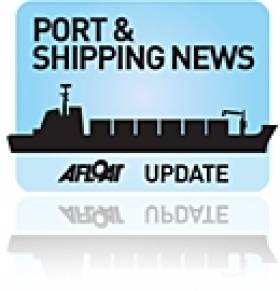Displaying items by tag: Burke Shipping
New Rail-Head Extension for Dublin Port
The Dublin Port Company has approved for the railway extension of the existing track tramway on Alexandra Road in order to serve one of the port's Lo-Lo container terminals, writes Jehan Ashmore.
The new extension is to directly connect rail-freight trains to the Common User Container Terminal at Alexandra Quay East. The extension will make a right turn off the Alexandra Road immediately after the Tara Mines zinc unloading facility and then along the quayside to the terminal, close to Ocean Pier.
Currently there are three weekly rail-freight trains running between Ballina, Co. Mayo and Dublin port, where the containers are required to be loaded and unloaded on Alexandra Road. From this location they are transferred by road to the terminal. When the new rail-tramway is completed in April, this will reduce costs by eliminating the transfer.
The rail-freight service to Dublin Port started operations in August 2009 and is run as a public private partnership between International Warehousing & Transport (IWT), Iarnrod Eireann and Dublin Port. IWT is the only train operator to the port, but it is believed that the Dublin Port Company has received a number of enquiries from other port users who are interested in using the new facility.
IWT are also agents for Tschudi Shipping and Tschudi Logistics on services to the Belgium, The Netherlands, Scandinavia and the Baltic Sea which use the Common User Container Terminal. The terminal is operated by the Burke Shipping Group through its subsidiary Portroe Stevedores. Other clients using the terminal are Cobelfret, C2C Lines, APL, Coastal Containers, Evergreen, Gracechurch and OOCL.
In addition to the terminal, the port operates two other container facilities at the Dublin Ferryport Terminal (DFT) and the Marine Terminals Ltd (MTL). According to figures released yesterday, Dublin Port recorded growth in Lo-Lo container volumes by 1.1% with an outturn of 554,259 TEU in 2010.
Dublin Port's position as the island's largest Lo-Lo (unitised) port was reinforced by the rail-freight services to Ballina. According to IWT the service on an annual basis saves up to 5.5m road kilometres and CO2 emissions are reduced by as much as 2,750 tonnes. In addition the service removes up to 10,000 trucks away from the roads.
The Common User Container Terminal is also a multi-model terminal, as Ro-Ro traffic started in 2009 with the installation of a new ramp at berth 36/37 at Ocean Pier, Alexandra Basin East. In 2010 the port recorded Ro-Ro freight units increase by 12.8% to 725,665 which is less than 1% down from the port's highest ever throughput.
Ro-Ro growth in 2010 was driven in part by the new CLdN /Cobelfret Ro-Ro services to Zeebrugge and Rotterdam. CLdN's ro-ro Yasmine made a recent first-time visit to the port followed by the newest vessel of the Belgium owned fleet, Amandine (see photo) the last of six con-ro newbuilds, which too made an inaugural visit to the port. The 195-m vessel departed from the upgraded ramp at Ocean Pier yesterday bound for Rotterdam.
For further port traffic figures which showed an overall increase in the port's volumes of 6.1% in 2010, logon here
























































